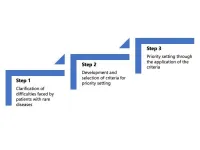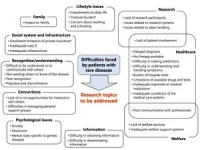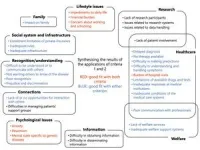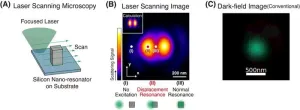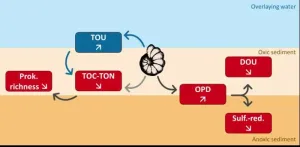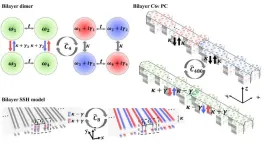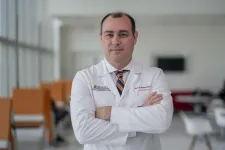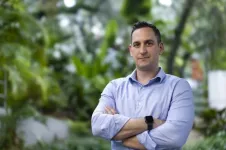(Press-News.org) Osaka, Japan – Patients with rare diseases have traditionally been the subjects of medical research. However, in recent years, their role has begun to shift from ‘research participants’ to ‘experts with a lived experience’, with some being involved in study planning, design and interpretation. Additionally they may soon be involved in helping pick the most important areas to prioritize for research.
In a study published last month in the journal Research Involvement and Engagement, researchers from Osaka University created an online space, referred to as the ‘Evidence-generating Commons’, for conversation, collaboration and knowledge sharing among patients with rare diseases, family members, researchers and former policymakers.
The researchers had two important goals: to generate evidence that could contribute to new policies in the field of rare diseases, and to explore ways that stakeholders could be involved in the process.
To do this, they designed a series of in-person and online workshops that focused on understanding the difficulties faced by patients with rare diseases and their families, deciding on criteria that could be used to set research priorities, and then setting research priorities by applying these criteria. The researchers were flexible in their process, allowing the discussion points to be modified as the workshops went along to make sure the opinions and ideas that emerged in previous meetings were captured.
“In the first stage, participants were given 10 minutes to brainstorm difficulties faced as well as solutions, before coming together as a group to discuss and organize these ideas,” explains lead author of the study Atsushi Kogetsu. “In the second and third stages, participants engaged in workshops on specific themes that had come up and worked together to build a set of research priorities.”
The ‘Commons’ was found to have a surprisingly positive impact on participants. “Everyone who participated in the project was able to grow and learn from each other, and several patients voiced their appreciation at having the opportunity to be part of the conversation and have their voices heard,” says Kazuto Kato, senior author.
The results showed that patients with rare diseases faced a wide range of issues including impacts on daily life, family problems and social issues. From an initial set of 228 sticky notes, the project members identified 33 core themes that could be organized into 10 categories. They also identified seven topics that were considered high priority, including financial burden, impacts on daily life, anxiety and the challenges of hospital visits. The achievements of the study were published in a research paper, for which several patients were co-authors.
Policymakers are increasingly aware that evidence comes from a variety of sources and that the unique perspectives of patients and their families is one such critical source. Yet there are still far too few examples of in-depth collaboration between patients and professionals. By bringing these voices together to create a set of research priorities, this study takes an important step toward more inclusive, collaborative and effective healthcare.
###
The article, “Enhancing evidence-informed policymaking in medicine and healthcare: stakeholder involvement in the Commons Project for rare diseases in Japan,” was published in Research Involvement and Engagement at DOI: 10.1186/s40900-023-00515-5.
About Osaka University
Osaka University was founded in 1931 as one of the seven imperial universities of Japan and is now one of Japan's leading comprehensive universities with a broad disciplinary spectrum. This strength is coupled with a singular drive for innovation that extends throughout the scientific process, from fundamental research to the creation of applied technology with positive economic impacts. Its commitment to innovation has been recognized in Japan and around the world, being named Japan's most innovative university in 2015 (Reuters 2015 Top 100) and one of the most innovative institutions in the world in 2017 (Innovative Universities and the Nature Index Innovation 2017). Now, Osaka University is leveraging its role as a Designated National University Corporation selected by the Ministry of Education, Culture, Sports, Science and Technology to contribute to innovation for human welfare, sustainable development of society, and social transformation.
Website: https://resou.osaka-u.ac.jp/e
END
Creating a future, together, for rare-disease research
Researchers from Osaka University develop a collaborative process for involving patients, families and policymakers in the conversation around priorities for rare-disease research
2023-12-12
ELSE PRESS RELEASES FROM THIS DATE:
In a new light – new approach overcomes long-standing limitations in optics
2023-12-12
Osaka, Japan – When you look up at the sky and see clouds of wondrous shapes, or struggle to peer through dense, hazy fog, you’re seeing the results of ‘Mie scattering’, which is what happens with light interacts with particles of a certain size. There is a growing body of research that aims to manipulate this phenomenon and make possible an array of exciting technologies.
Now, in a study recently published in Nature Communications, a multi-institutional research team including Osaka University has overcome what were thought to be fundamental limitations of how to enhance the efficiency of Mie scattering.
Researchers in the field ...
Underwater architects: The ‘burrowing effect’ of foraminifera on marine environments
2023-12-12
Dr. Dewi Langlet, a scientist at the Evolution, Cell Biology and Symbiosis Unit at the Okinawa Institute of Science and Technology (OIST), studies foraminifera, single-cell organisms with shells made of calcium carbonate. He and his collaborators have shown for the first time that the burrowing of single-celled organisms in marine ecosystems affects oxygen distribution and bacterial diversity in sea sediments. Their findings have been published in the journal Biogeosciences.
Foraminifera are mostly marine organisms ...
A scheme for realizing nonreciprocal interlayer coupling in bilayer topological systems
2023-12-12
The exchange of energy and environment is inevitable in any physical system, so non-Hermitian systems that can be described by non-Hermitian Hamiltonians are ubiquitous. There are two kinds of non-Hermitian Hamiltonians, describing nonreciprocal systems with anisotropic coupling, also referred to as nonreciprocal coupling, and gain-loss systems. Three physicists won the Nobel physics prize for their discovery of topological phases and transitions in 2016. Recently, an emerging interplay of topological photonics and non-Hermitian photonics has ...
Combination immunotherapy produces high response rate in early results of Sylvester trial targeting high-risk follicular lymphoma
2023-12-12
DOWNOADABLE VIDEO
MIAMI, FLORIDA (EMBARGOED UNTIL MONDAY, DEC. 11, 2023 AT 8:45 P.M. ET) – Researchers conducting a Phase 2 clinical trial at Sylvester Comprehensive Cancer Center at the University of Miami Miller School of Medicine say a new combination of antibody therapies produced a ‘surprisingly high’ response rate in patients with high-risk follicular lymphoma, a type of non-Hodgkin lymphoma.
Based on these initial findings – reported in an oral presentation at the 65th ASH Annual Meeting and Exposition in San Diego, California, Dec. 9-12 – the research team plans to expand the number of trial participants ...
Multicenter study at Sylvester, other academic centers shows CAR-T cell therapy safe, effective even for high-risk patients
2023-12-12
DOWNLOADABLE VIDEO IS AVAILABLE HERE
MIAMI, FLORIDA (EMBARGOED UNTIL MONDAY, DEC. 11, 2023, AT 8:45 PM ET) – CAR-T cell therapy is a safe and effective treatment for diffuse large B-cell lymphoma (DLBCL), even for patients regarded as high risk due to comorbidities.
That’s the conclusion of a five-year analysis of results from the U.S. Lymphoma CAR-T Cell Consortium, a group of 17 academic cancer centers in the U.S. Their findings will be presented at the American Society of Hematology’s 2023 annual meeting in San Diego, Dec. 9-12.
“CAR-T has caused a paradigm shift in the treatment of patients with diffuse large B-cell ...
Clinical trial proves that the ketogenic diet is effective at controlling polycystic kidney disease
2023-12-12
(Santa Barbara, Calif.) — It’s official: The ketogenic diet proved to be effective at controlling polycystic kidney disease (PKD) in the first randomized controlled clinical trial of ketogenic metabolic therapy for PKD.
“I’m really happy about these clinical trial results,” said UC Santa Barbara biologist Thomas Weimbs, whose lab was part of an international collaboration to investigate the effect of the fasting response known as ketosis on the cysts that are the hallmark of the disease. “We now have the first evidence in humans that the cysts really don’t like ...
New drug helps narrow racial survival disparity in patients with acute myeloid leukemia
2023-12-12
SAN DIEGO – Non-Hispanic Black patients with acute myeloid leukemia (AML) are living longer, now that new therapies are available, according to a study presented by researchers from the University of Pennsylvania Perelman School of Medicine and Penn Medicine’s Abramson Cancer Center at the 65th American Society of Hematology (ASH) Annual Meeting and Exposition (Abstract 955).
In the past, the standard treatment for AML, a cancer that affects the blood and bone marrow, was intensive chemotherapy. Unfortunately, many older patients were ineligible ...
Scientific community: Ukraine may have lost 20% of its pre-war scientific research capacity
2023-12-12
Ukraine may have lost about 20% of its scientific research capacity — time directly spent by scientists on research activities — as a consequence of the Russia-Ukraine war. The findings, published in Humanities & Social Sciences Communications, also suggest that over 17% of scientists who were research active in Ukraine before the war may have left the scientific research sector by December 2022.
Since the full-scale Russian invasion of Ukraine began in February 2022, there has been disruption to many sectors of the Ukrainian economy, including the Ukrainian scientific research sector. However, it has so far proved difficult to quantify many of the key impacts of the ...
Ukraine has lost 18% of its scientists due to the war
2023-12-12
Until the early morning of February 24th, 2022, Ukrainian scientist Olena Iarmosh did not believe there would be a Russian invasion of Ukraine. Iarmosh grew up and had settled in Kharkiv, her beloved city in Eastern Ukraine and only 40 km away from the Russian border, where she worked for more than 16 years as a lecturer in higher education before fleeing to Switzerland. At approximately 5AM, she awoke to the sounds of bombing, hoping that they were merely the loud sounds of technical maintenance at the local power plant.
“My city looks worse now after the bombing than after two occupations by German troops,” ...
Extremely rare bird captured on film
2023-12-12
A striking and extremely rare half female, half male bird has been spotted by a University of Otago zoologist.
Sesquicentennial Distinguished Professor Hamish Spencer was holidaying in Colombia when an amateur ornithologist John Murillo pointed out a wild Green Honeycreeper with distinct half green, or female, and half blue, male, plumage.
“Many birdwatchers could go their whole lives and not see a bilateral gynandromorph in any species of bird. The phenomenon is extremely rare in birds, I know of no examples from New Zealand ever.
“It is very striking, I was very privileged to see it,” Professor Spencer says.
Photographs of the bird make ...
LAST 30 PRESS RELEASES:
Public and patient involvement in research is a balancing act of power
Scientists discover “bacterial constipation,” a new disease caused by gut-drying bacteria
DGIST identifies “magic blueprint” for converting carbon dioxide into resources through atom-level catalyst design
COVID-19 vaccination during pregnancy may help prevent preeclampsia
Menopausal hormone therapy not linked to increased risk of death
Chronic shortage of family doctors in England, reveals BMJ analysis
Booster jabs reduce the risks of COVID-19 deaths, study finds
Screening increases survival rate for stage IV breast cancer by 60%
ACC announces inaugural fellow for the Thad and Gerry Waites Rural Cardiovascular Research Fellowship
University of Oklahoma researchers develop durable hybrid materials for faster radiation detection
Medicaid disenrollment spikes at age 19, study finds
Turning agricultural waste into advanced materials: Review highlights how torrefaction could power a sustainable carbon future
New study warns emerging pollutants in livestock and aquaculture waste may threaten ecosystems and public health
Integrated rice–aquatic farming systems may hold the key to smarter nitrogen use and lower agricultural emissions
Hope for global banana farming in genetic discovery
Mirror image pheromones help beetles swipe right
Prenatal lead exposure related to worse cognitive function in adults
Research alert: Understanding substance use across the full spectrum of sexual identity
Pekingese, Shih Tzu and Staffordshire Bull Terrier among twelve dog breeds at risk of serious breathing condition
Selected dog breeds with most breathing trouble identified in new study
Interplay of class and gender may influence social judgments differently between cultures
Pollen counts can be predicted by machine learning models using meteorological data with more than 80% accuracy even a week ahead, for both grass and birch tree pollen, which could be key in effective
Rewriting our understanding of early hominin dispersal to Eurasia
Rising simultaneous wildfire risk compromises international firefighting efforts
Honey bee "dance floors" can be accurately located with a new method, mapping where in the hive forager bees perform waggle dances to signal the location of pollen and nectar for their nestmates
Exercise and nutritional drinks can reduce the need for care in dementia
Michelson Medical Research Foundation awards $750,000 to rising immunology leaders
SfN announces Early Career Policy Ambassadors Class of 2026
Spiritual practices strongly associated with reduced risk for hazardous alcohol and drug use
Novel vaccine protects against C. diff disease and recurrence
[Press-News.org] Creating a future, together, for rare-disease researchResearchers from Osaka University develop a collaborative process for involving patients, families and policymakers in the conversation around priorities for rare-disease research
